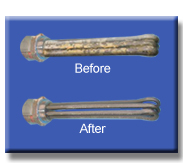Today’s inquiry came to us from ‘Mike L’ who asked about ways to soften his water without having to use a salt-based softening system.
I live in a small twin (3 bed/1.5 bath) that I lease. When we moved in, we noticed the water was particularly hard (10 GPG) and it was causing dry skin after showers and other issues. We don’t use a lot of water and we don’t have much space (1,300 sq. ft.). I also don’t much prefer the saltiness of “softened” water. My landlord gave me the OK to install a simple filtration system. I’m looking for something cheap, compact and simple. I don’t need 0gpg either, if I can lower down to a 3-4 GPG I would be happy.
Seems simple right? I was thinking maybe a 400GPD RO system but they all come with faucets which makes me think they may not be usable to throw in-line on the water system.
Do you know of anything (under $1,000) I can do to clean up my water and make it just a little softer?
Good news, Mike! Recent developments in the water softener industry include water softeners that do not use salt as the primary treating agent. Reasons for the salt-free water softeners range from States like California putting a ban on them for environmental reasons to people (like yourself) simply not enjoying the taste and/or texture of the water produced by salt-based water softeners.
Eagle A1000AS Anti-Scale Saltless Water Conditioner
To the left you will see an example of a water softener that uses a special filtration media to remove calcium and magnesium from source water instead of salt. The unit also comes equipped with a sediment filter, solid carbon block filter for VOC’s (volatile organic compounds) and an Ultrafiltration Filter good for removing particles as small as .01 microns.
Mike, you mentioned reverse osmosis as a possible option and based upon what you said you wanted from the water treatment system, we don’t think that will work out as well as you’d like, though we do agree that reverse osmosis water filter do an excellent job of filtering water.
Reverse osmosis units do not connect up as inline filters as neatly and tidily as it sounds like you’d prefer. They require drains for ‘waste water’ that gets rejected by the membranes and flushed out during backwashing. Also, reverse osmosis water filters require power which means running a power line to the unit.
The Eagle A1000AS Anti-Scale Saltless Water Conditioner uses no power, requires no drain, uses no salt or environmentally harmful chemicals, and supposedly will help to remove existing calcium and magnesium deposits already clogging water lines.
Moral of the story?
Mike, we suggest having your water tested by a certified laboratory in your area or having a mail order service such as National Testing Laboratories perform a thorough analysis of your water. From the sounds of things, your faucets could possibly have more than just calcium and/or magnesium coming out of them and you will not know for sure until you test.
Also, even after installing a water filtration system, Mike, you will want to perform regular, or at least occasional, water testing for things like total hardness to make certain the filtration system you chose has not stopped working as expected. Products like the WaterWorks Total Hardness Test Strips make testing water hardness both easy and inexpensive.






